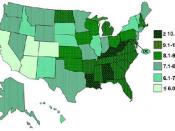During childhood development, one type of conduct which is characteristically seen is oppositional behaviour. Oppositional behaviour is expressed through disobedient, markedly defiant language, tendency to argue with the parents, or simply ignores the parents' word. It is most frequently seen in children below the age of ten years old. This kind of behaviour is acceptable until it gets too extreme. The behaviour would be classified as abnormal if it fits into the following criteria. "Behaviour is unusual" (Nevid, Rathus, and Greene, 2003), e.g. the child likes to spend time purposefully annoying the parents. "Behaviour is socially unacceptable or violates social norm" (Nevid, et al., 2003), e.g. the child does not obey the teacher and throws book at her. "Perception or interpretation of reality is faulty" (Nevid, et al., 2003), e.g. the child thinks that annoying the parents is the one and only best way to achieve what he/she wants. "The person is in significant personal distress" (Nevid, et al.,
2003), e.g. the child gets very angry when reject by the parents. "Behaviour is maladaptive or self-defeating" (Nevid, et al., 2003), e.g. the child draws on the furniture when he/she already knew that his/her parents is going to be very angry and yell at him/her. "Behaviour is dangerous" (Nevid, et al., 2003), e.g. the child hit the window or bans himself/herself by the wall when parents does not satisfy his/her needs. If the shows the above conduct very often, this behaviour might be consider abnormal or could be classify as a disorder. "Oppositional Defiant Disorder" is characterised by tendency to irritate or annoy others purposefully or aggressiveness. Children with oppositional defiant disorder tend to have negative response (e.g. no) when given commands by their parents. There are many paradigms which we can use to explain this oppositional behaviour; the most common...



Good
a good and well-versed essay.
0 out of 0 people found this comment useful.